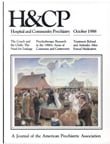The Couch and the Cloth: The Need for Linkage
Abstract
Data from the Epidemiologic Catchment Area study were used to compare the demographic characteristics and psychiatric symptomatology of persons classified into four groups based on source of mental health services: clergy only, mental health specialists only, both clergy and mental health specialists, and neither source. Those receiving services from both clergy and mental health specialists were more likely to have major affective and panic disorders than those who sought services from clergy or mental health specialists only or who sought services from neither. Those in the care of mental health specialists were more likely to have substance abuse disorders. Those in the care of clergy only were as likely as those seeing mental health specialists only to have serious mental disorders. The data make clear the need for formal linkages between clergy and mental health professionals.
Access content
To read the fulltext, please use one of the options below to sign in or purchase access.- Personal login
- Institutional Login
- Sign in via OpenAthens
- Register for access
-
Please login/register if you wish to pair your device and check access availability.
Not a subscriber?
PsychiatryOnline subscription options offer access to the DSM-5 library, books, journals, CME, and patient resources. This all-in-one virtual library provides psychiatrists and mental health professionals with key resources for diagnosis, treatment, research, and professional development.
Need more help? PsychiatryOnline Customer Service may be reached by emailing [email protected] or by calling 800-368-5777 (in the U.S.) or 703-907-7322 (outside the U.S.).



